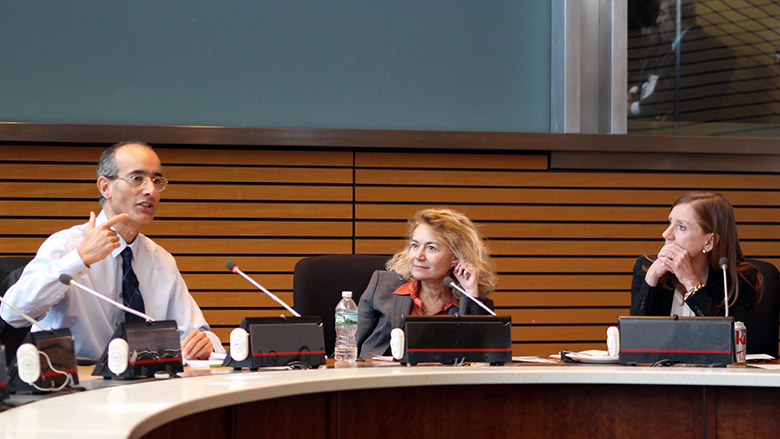Trade fell dramatically during the 2008 financial crisis and has grown sluggishly since then. But this overall trend obscures an important fact: trade in services has proven remarkably resilient, and has been steadily growing since 2010. This expansion of services trade—from health and education to transport, telecommunications, and tourism—presents developing countries with significant opportunities.
Until recently data on services trade policies was sparse. But in this month’s Policy Research Talk, Research Manager Aaditya Mattoo unveiled a body of new research and data, including the Services Trade Restrictions Database, that is advancing knowledge about services trade policies, and how best to reform them.
“There are many questions around services trade we are still trying to understand better,” said Research Director Asli Demirguc-Kunt, who hosted the event. “What impedes services trade? How should we best design service trade policies? And what is the development impact? The answers to these questions matter since the services sector is getting bigger by the year in many developing countries.”
As Mattoo made clear, trade in services is vital not only for rich countries but also the developing world. Drawing on data on the 40 poorest countries in the world, Mattoo found that services account for more than half of GDP and employment.
“If these countries are to grow, and lift people out of poverty, there needs to be a dramatic improvement in the state of services,” Mattoo said. Services are important not only because of their share of GDP, but also because other industries, including manufacturing and agriculture, depend on the strength of the sector.
Trade in services includes cross-border trade in communications and transport, as well as outsourced business services; consumption abroad by foreigners of tourism, health and education; foreign direct investment (FDI) in banking, communication, and distribution; and temporary migration of doctors and teachers. Together, trade in these services through different modes could have a transformative effect on poorer countries.
In his research, Mattoo found that openness to trade in services is associated not only with more rapid growth but also increased economic stability. “Countries that are more dependent on services exports, saw less volatility in trade during the financial crisis,” he said.
Mattoo highlighted two phenomena that are together creating a surge in opportunities in services trade. The first is advancement in technology that is dramatically changing the way people access service providers and reducing the need for in-person interaction. Telemedicine, mobile banking, and digitized business services are all good examples of this phenomenon.


